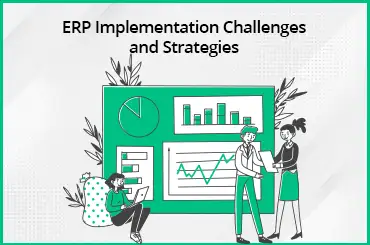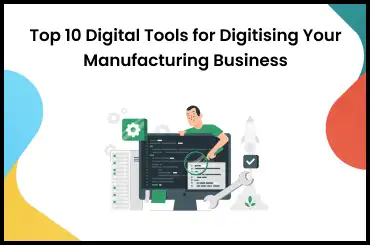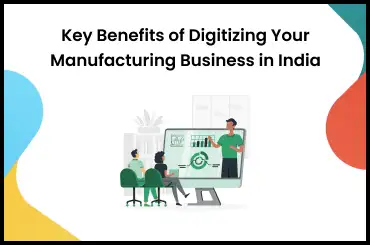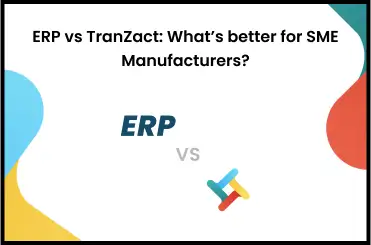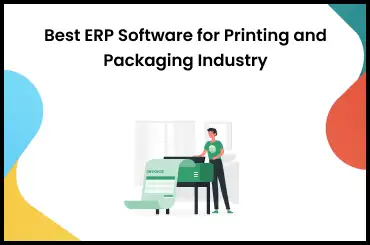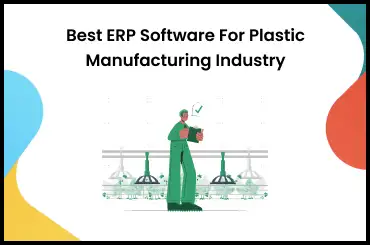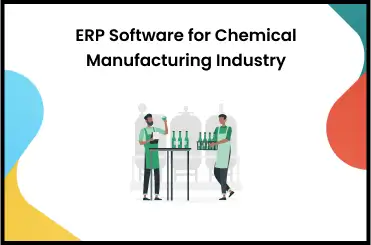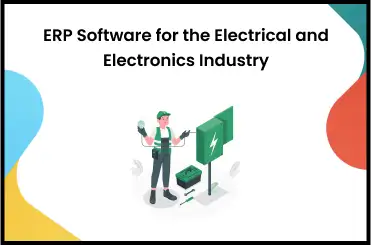Discrete Manufacturing ERP makes work for industries easier. By bringing together information and workflows, businesses gain visibility and efficiency. ERP systems improve resource distribution, reducing lead times and production costs.
What Is Discrete ERP Software?
Discrete ERP software is a system designed for industries that make specific items, like cars or electronics. Discrete manufacturing ERP software simplifies processes like:
- Inventory management
- Production planning
- Quality control
- Improving efficiency
- Reducing costs.
Main Benefits Of Discrete ERP Software
Discrete ERP software helps factories and companies make things better by organizing how they work and making smart decisions quickly. There are many advantages of discrete ERP software. Let us have a look at them:
1. Simplified Processes
Discrete ERP software works on
- Inventory management
- Production planning
- Quality control
- Reducing manual efforts
2. Increased Efficiency
Automation of workflows boosts efficiency. This leads to faster production cycles and better resource division.
3. Cost Reduction
ERP systems help lower production costs and improve overall profit by reducing wastage. They reduce cost by:
- Simplifying Processes
- Providing Real-time Data
- Optimized Inventory Management
- Quality Control
- Supply Chain Coordination
- Reduced Manual Errors
4. Real-time Analytics
Real-time data access helps businesses with better decision-making, making good responses to market shifts and customer needs.
5. Enhanced Visibility
ERP software gives a complete view of the manufacturing process, making it easier to track progress and spot potential problems.
Read Also: What Is Inventory Management System?
Why Should You Use Discrete ERP Software?
Discrete ERP software makes work easier for factories and businesses. It helps organize and use resources better and faster. Some of the reasons why businesses can choose ERP software are:
1. Process Optimization
Discrete manufacturing ERP systems simplify many processes, resulting in better results and lesser operational waste.
2. Inventory Management
Efficient tracking and management of inventory preventing stock outs or overstocking.
3. Production Planning
ERP software helps in accurate production scheduling, resource distribution, and timely delivery of products.
4. Quality Control
Quality management helps maintain product quality with industry standards.
5. Real-time Insights
Access to real-time data delivers better decision-making, enabling quick responses to market changes and customer demands.
Read Also: AP Automation - Accounts Payable Automation Software
Who Uses Discrete ERP Software?
There are many industries that use Discrete ERP Software. Here are some of the industries that use this software:
1. Automotive Industry
Car, motorcycle, and other vehicle makers use ERP systems to manage their supply chains and production processes.
2. Electronics and Technology
Companies producing electronics, computer hardware, and consumer gadgets use ERP software to improve production and inventory management.
3. Aerospace and Defense
ERP systems help in managing difficult manufacturing processes.
4. Industrial Machinery
Manufacturers of heavy machinery and equipment use ERP software for simplified production planning and quality control.
5. Consumer Goods
Companies producing consumer products like appliances, furniture, and home goods benefit from ERP's efficient inventory and supply chain management.
Read Also: AP Automation - Accounts Payable Automation Software
Kinds Of Discrete ERP Software
There are different kinds of Discrete ERP software made for different types of businesses. The different kinds of discrete ERP software are:
1. On-Premises ERP Software
This traditional type of ERP system is installed and maintained on the company's own servers and infrastructure.
2. Open-Source ERP Software
These ERP solutions come with the source code, allowing businesses to modify the software according to their needs.
3. Industry-Specific ERP Software
Some ERP systems are made to meet the specific requirements of certain industries like
- Cars
- Electronics
- Drugs
Read Also: Profit From Waste: How to Manage Your Scrap Inventory
Discrete ERP Software Features
Features of Discrete ERP software help businesses manage and make informed decisions. There are multiple ERP software features that help businesses. Let us have a look at them:
1. Production Planning
Discrete ERP software helps plan production by helping in
- Distributing resources
- Scheduling
- Ordering operations.
2. Inventory Management
Tracks inventory levels, ensuring availability of materials, and reducing excess stock.
3. Quality Control
Assembled and discrete products ERP systems include tools for monitoring and maintaining product quality through
- inspections
- tests
- sticking to industry standards and regulations.
4. Bill of Materials (BOM) Management
BOM functionality enables the creation and management of detailed lists of components, and materials required to produce a product.
Additional Discrete ERP Features
There are extra things that Discrete ERP software can do to make your business even better. The additional features of Discrete ERP features are:
1. Shop Floor Automation
Discrete ERP software may combine with manufacturing execution systems (MES) to automate and monitor various production processes.
2. Workforce Management
ERP systems may offer workforce planning to manage labor resources and help production schedules.
3. Demand Prediction
Prediction tools assist in predicting future demand aiding in inventory planning and production scheduling.
Read Also: Profit From Waste: How to Manage Your Scrap Inventory
Trends Related To Discrete ERP Software
The evolving trends in Discrete ERP software are reshaping the way businesses manage their operations and resources. The trends related to the software are:
1. Cloud-Based Solutions
The adoption of cloud-based discrete ERP software continues to rise due to its scalability, cost-effectiveness, and accessibility.
2. Mobile Applications
ERP vendors are developing more mobile-friendly interfaces and applications, allowing users to access critical data and functionalities on smartphones and tablets for increased productivity and flexibility.
3. Integration with IoT
Discrete ERP systems are increasingly integrating with IoT devices on the shop floor to gather real-time data.
4. AI and Machine Learning
AI-driven features are being put into ERP software to
- enhance decision-making
- automate repetitive tasks
- Improve inventory levels
- improve forecasting accuracy.
5. Industry-Specific Solutions
Vendors are offering industry-specific ERP solutions that is made to the unique needs of various discrete manufacturing sectors.
Discrete ERP Software: Solutions and Services
Discrete ERP software helps businesses run smoothly by offering various solutions and services. Let us look at some of the solutions offered by them:
1. ERP Software Suites
Various software vendors offer discrete ERP solutions with modules to help to the specific needs of manufacturing industries.
2. Open-Source ERP Solutions
Open-source ERP software allows businesses to customize and modify the code to meet their unique requirements.
3. ERP Consulting Services
ERP consultants provide expertise in system selection
- Implementation
- Customization
- Optimization.
5. ERP Implementation Partners
Implementation partners collaborate with ERP vendors to change the software for individual businesses.
Read Also: Inventory vs. Stock: What’s the Difference & Why It Doesn’t Really Matter
Gain A Competitive Edge With Discrete Erp Software
Discrete ERP Software is a crucial tool for industries engaged in the production of distinct items, streamlining operations, optimizing processes, and improving efficiency.
To experience the best ERP for discrete manufacturing, consider exploring TranZact. TranZact offers an ERP system that is made to meet the unique needs of discrete manufacturing industries.
FAQs On Discrete Manufacturing ERP Systems
1. What is a Discrete Manufacturing ERP System?
A Discrete Manufacturing ERP System is a specialized software designed to simplify working processes in industries producing distinct items, like cars or electronics.
2. What are the key benefits of using a Discrete Manufacturing ERP System?
Key benefits include
- improved efficiency
- cost reduction
- real-time insights
- enhanced quality control
3. Can Discrete ERP Systems be customized for specific industries?
Yes, Discrete ERP Systems can be changed to meet the unique needs of various discrete manufacturing sectors, such as cars, electronics, or drugs.
4. How does Discrete ERP software aid in inventory management?
Discrete ERP software helps track and manage inventory levels. This helps in optimal stock levels and minimizing stock or stockouts.
5. What features are typically included in Discrete Manufacturing ERP Systems?
Common features include
- production planning
- inventory management
- quality control
- reporting and analytics.
6. Is it necessary to implement a cloud-based Discrete ERP solution?
No, cloud-based ERP solutions offer flexibility and accessibility advantages.








